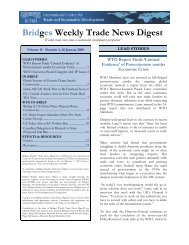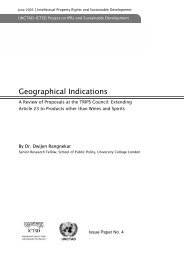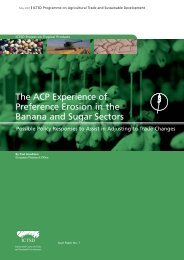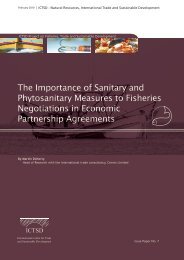Intellectual Property and Competition Law - IPRsonline.org
Intellectual Property and Competition Law - IPRsonline.org
Intellectual Property and Competition Law - IPRsonline.org
Create successful ePaper yourself
Turn your PDF publications into a flip-book with our unique Google optimized e-Paper software.
ICTSD Programme on IPRs <strong>and</strong> Sustainable DevelopmentixEXECUTIVE SUMMARY<strong>Intellectual</strong> property (IP) law subjects intellectual assets to the owner’s exclusive control. <strong>Competition</strong>law on the other h<strong>and</strong>, seeks to avoid market barriers <strong>and</strong> benefit consumers by ensuring that amultiplicity of suppliers of goods, services <strong>and</strong> technologies may effectively compete against eachother. The relationship between these two areas of law poses uniquely difficult challenges to policymakers,particularly in developing countries, the majority of which have little or no tradition in theapplication of competition law <strong>and</strong> policies.A number of regulations linked to the acquisition <strong>and</strong> exercise of intellectual property rights,such as those dealing with the marketing approval of pharmaceuticals <strong>and</strong> agrochemicals, directlyinfluence market entry <strong>and</strong> contestability. Such regulations integrate what may be called a country’s“competition policy”. Given the lack of legislation, weak implementation or absence of policies todeal with the IP-competition relationship in developing countries, a competition policy approach maybe particularly useful to ensure a pro-competitive exercise of intellectual property rights (IPRs).Developing countries can follow their own approach to competition law <strong>and</strong> IPRs since there are nointernational rules (with the exception of Article 40 of the Agreement on Trade-Related Aspects of<strong>Intellectual</strong> <strong>Property</strong> Rights (TRIPS) that constrain the capacity of such countries to discipline IPrelatedanti-competitive behaviour. In the absence of international rules on the matter, countries mayhave different views about what constitutes undesirable anti-competitive effects as a result of theexclusivity granted under IPRs.Although competition law has usually dealt with markets for goods, markets for technologiesexist separately from those for products or services <strong>and</strong> may also be subject to competition law.<strong>Competition</strong> law may, in particular, address situations in which IP is used to charge excessive prices foror prevent access to protected technologies. <strong>Competition</strong> provides a strong incentive for developingnew technologies in certain fields. In cases where IPRs are granted, governments can adopt measuresto mitigate the monopolisation of technologies <strong>and</strong> promote competition. Thus, although Article 31(b)of the TRIPS Agreement only refers to the refusal of a voluntary licence as a condition for the grantingof a compulsory licence, the unilateral refusal to license a patent (generally known as “refusal todeal”) can be considered grounds for granting a compulsory licence <strong>and</strong> has been contemplated in anumber of national patent laws.The possibility of allowing third parties to use IPRs in cases of refusal to deal has also been consideredin some countries under competition law in the context of the “essential facilities” doctrine. Thisdoctrine applies when one firm, which controls an essential facility, denies a second firm reasonableaccess to a product or service that the second firm must obtain in order to compete with the first.While some US court decisions have suggested that information may constitute an essential facility,the extent of application of this doctrine to intellectual property cases is uncertain. Under EuropeanCommunity law, an “essential facility” may include an intellectual property right. An IPR holderis not entitled to exclude competitors from the use of his/her rights when a licence is essentialfor competition, such as where the refusal to license prevents the introduction of a new productor allows the intellectual property holder to monopolise a secondary market. Developing countriesmay draw interesting lessons from the application of the concept of refusal to deal <strong>and</strong> the essentialfacilities doctrine in developed countries. However, there are no rigid models <strong>and</strong> developing countriescan elaborate their own approaches on the matter in order to respond to their public interests.It is generally accepted in developed countries that holding IPRs does not necessarily confer marketpower per se. However, the respect of IPRs under competition law is premised on the assumption









